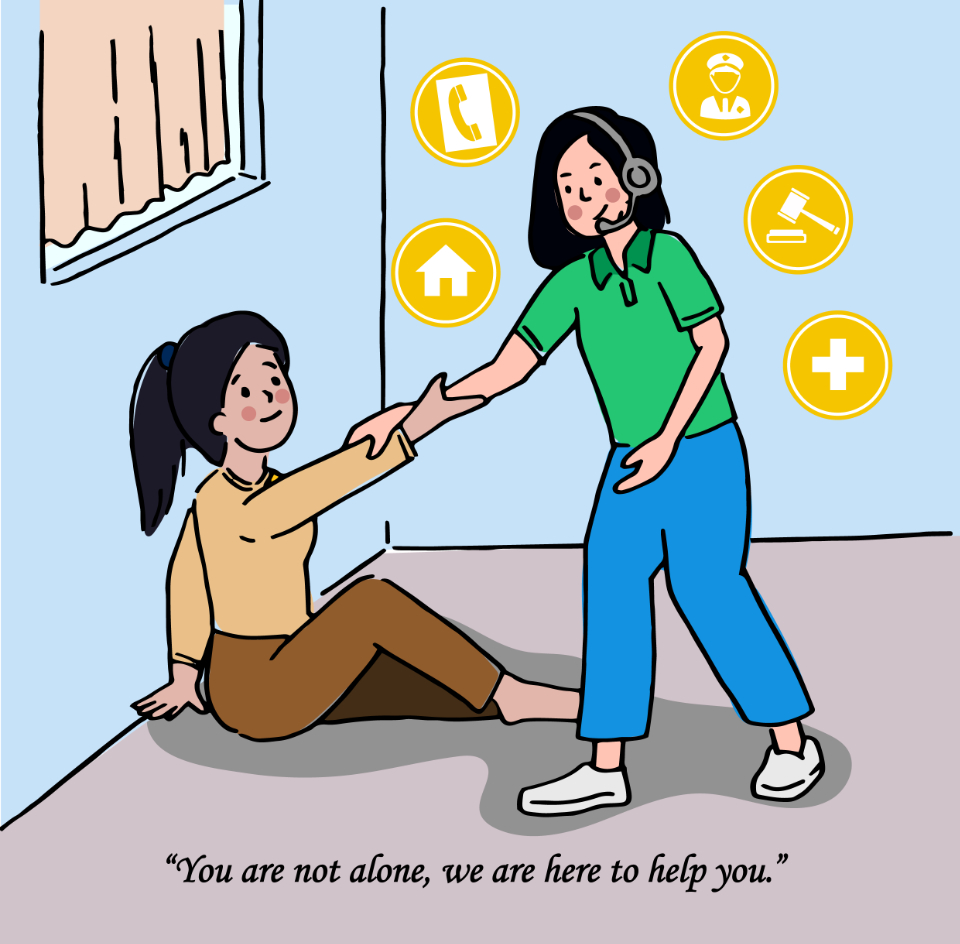You are not alone, we are here to help you.
Interview with Vinh (alias), counsellor, Viet NamDate:

Vinh: I am working at a non-profit organization that focuses on the rights of women and children, and I am responsible for the hotline service for survivors of violence.
We receive requests for help through both domestic calls and also online messaging platforms from Vietnamese women who are living abroad. They feel comfortable talking to us as we speak the same language. Messages come from everywhere in the world. There are always messages from women migrant workers living aboard who need our support.
Unfortunately, our prediction that the number of calls would skyrocket during COVID-19 was right. It doubled, then tripled. It would have been okay if we got support from local government agencies as we normally do, but all the officers and resources were devoted to the COVID-19 response. Some of the survivors who contacted local authorities were turned away. Instead of supportive words, the responses that they received from officials were like, “We are busy taking care of the whole society, so manage your home business with your husband” or “You wasted our time. Don’t you feel guilty about that?” There were not enough people who the survivors could lean on.
We were lucky as we received support from the Safe and Fair Programme to have more hotline operators, so we can operate 24/7. This has been critical as many of the calls come in late at night. Of course, if survivors are living with their abusers, the only time they can call is when the abusers are sleeping. Even those calls are often interrupted by the fear of being discovered. One time, I received a call in the middle of the night, and the husband snatched the phone from the caller. I immediately changed my tone of voice and pretended that I was her old classmate who is now living far away, and said we were just talking about how we are living in this difficult time. I had to chat with him and pretend I didn’t know about his abusive behaviour to reduce his suspicion and to protect the survivor as much as I could.
It’s not surprising that the increase in violence is not on the political agenda, but it’s still disappointing. Many people are talking about how we can better respond to COVID-19 and how we can recover our economy. Lots of strategies are coming out and decision-makers are discussing these. However, I sense that no one really sees the increase in violence as part of the COVID-19 issue and no one talks about women migrant workers who are at the risk of violence. It is a problem that increased related to COVID-19, so better response to violence against women and protecting survivors including women migrant workers should be part of the COVID-19 response strategies.
Supporting survivors of violence can be an overwhelming job, especially during this tough time. The stress from work long hours has made many of my colleagues emotionally drained. While we support survivors out there, it is also very important to keep ourselves healthy.
I want to pass a message to survivors, if they are reading this article somewhere in the world: you are not alone, we are here to help you.
The ILO-UN Women programme “Safe and Fair: Realizing women migrant workers’ rights and opportunities in the ASEAN region”, under the global EU-UN Spotlight Initiative to eliminate violence against women and girls, supports front-line service providers to ensure essential services are available for women migrant workers who are subject to violence More: www.spotlightinitiative.org/safe-and-fair
If you or someone you know has experienced violence against women in Viet Nam, contact CSAGA for support.
- Hotline: 024 3333 55 99
- Messenger: https://www.facebook.com/messages/t/CsagaVietnam
More contacts of service providers are available in the Service Directory for Women Migrant Workers in the ASEAN region: https://bit.ly/services4wmw
Interviewed by Do Phuong
Written by Younghwa Choi
Edited by Gihan Hassanein